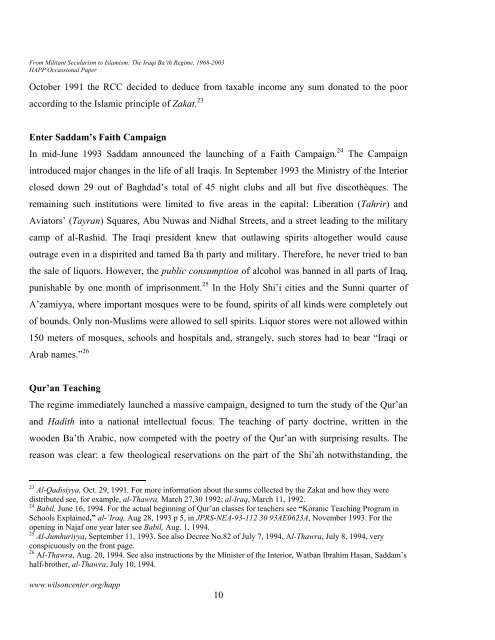From Militant Secularism to Islamism
From Militant Secularism to Islamism
From Militant Secularism to Islamism
Create successful ePaper yourself
Turn your PDF publications into a flip-book with our unique Google optimized e-Paper software.
<strong>From</strong> <strong>Militant</strong> <strong>Secularism</strong> <strong>to</strong> <strong>Islamism</strong>: The Iraqi Ba’th Regime, 1968-2003<br />
HAPP Occassional Paper<br />
Oc<strong>to</strong>ber 1991 the RCC decided <strong>to</strong> deduce from taxable income any sum donated <strong>to</strong> the poor<br />
according <strong>to</strong> the Islamic principle of Zakat. 23<br />
Enter Saddam’s Faith Campaign<br />
In mid-June 1993 Saddam announced the launching of a Faith Campaign. 24 The Campaign<br />
introduced major changes in the life of all Iraqis. In September 1993 the Ministry of the Interior<br />
closed down 29 out of Baghdad’s <strong>to</strong>tal of 45 night clubs and all but five discothèques. The<br />
remaining such institutions were limited <strong>to</strong> five areas in the capital: Liberation (Tahrir) and<br />
Avia<strong>to</strong>rs’ (Tayran) Squares, Abu Nuwas and Nidhal Streets, and a street leading <strong>to</strong> the military<br />
camp of al-Rashid. The Iraqi president knew that outlawing spirits al<strong>to</strong>gether would cause<br />
outrage even in a dispirited and tamed Ba ’ th party and military. Therefore, he never tried <strong>to</strong> ban<br />
the sale of liquors. However, the public consumption of alcohol was banned in all parts of Iraq,<br />
punishable by one month of imprisonment. 25 In the Holy Shi’i cities and the Sunni quarter of<br />
A’zamiyya, where important mosques were <strong>to</strong> be found, spirits of all kinds were completely out<br />
of bounds. Only non-Muslims were allowed <strong>to</strong> sell spirits. Liquor s<strong>to</strong>res were not allowed within<br />
150 meters of mosques, schools and hospitals and, strangely, such s<strong>to</strong>res had <strong>to</strong> bear “Iraqi or<br />
Arab names.” 26<br />
Qur’an Teaching<br />
The regime immediately launched a massive campaign, designed <strong>to</strong> turn the study of the Qur’an<br />
and Hadith in<strong>to</strong> a national intellectual focus. The teaching of party doctrine, written in the<br />
wooden Ba’th Arabic, now competed with the poetry of the Qur’an with surprising results. The<br />
reason was clear: a few theological reservations on the part of the Shi’ah notwithstanding, the<br />
23 Al-Qadisiyya, Oct. 29, 1991. For more information about the sums collected by the Zakat and how they were<br />
distributed see, for example, al-Thawra, March 27,30 1992; al-Iraq, March 11, 1992.<br />
24 Babil, June 16, 1994. For the actual beginning of Qur’an classes for teachers see “Koranic Teaching Program in<br />
Schools Explained,” al-’Iraq, Aug 28, 1993 p 5, in JPRS-NEA-93-112 30 93AE0623A, November 1993. For the<br />
opening in Najaf one year later see Babil, Aug. 1, 1994.<br />
25 Al-Jumhuriyya, September 11, 1993. See also Decree No.82 of July 7, 1994, Al-Thawra, July 8, 1994, very<br />
conspicuously on the front page.<br />
26 Al-Thawra, Aug. 20, 1994. See also instructions by the Minister of the Interior, Watban Ibrahim Hasan, Saddam’s<br />
half-brother, al-Thawra, July 10, 1994.<br />
www.wilsoncenter.org/happ<br />
10


